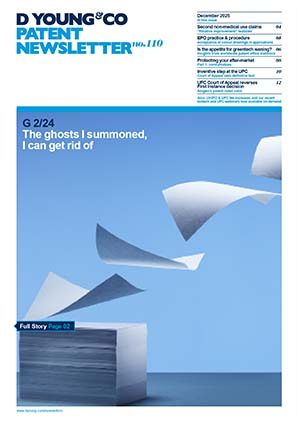Late-filed claims at the EPO Opposition Division - a new hope
In T0688/16, the Board of Appeal held that new claim requests can be filed during opposition proceedings if there is a change of opinion by the Opposition Division during proceedings. The Board of Appeal held that such new claim requests cannot be considered “late-filed”.
It is often a frustration experienced during opposition and appeal proceedings to have new claim requests, facts, objections or evidence considered as late-filed and therefore not admitted into proceedings. The EPO is keen to reduce its backlogs and in recent years it has been trying to find ways of streamlining matters [see note 1 below].
As we previously reported [see note 2 below], from 01 January 2020 the procedural rules of the Board of Appeal (RPBA) will be amended with the aim of improving the efficiency of the appeal process. In summary, it will become much more challenging to have new claim requests, facts, objections, or evidence admitted into proceedings at the appeal stage which were not admitted during the first instance proceedings, unless it is decided that the decision not to admit them was an error or unless the circumstances of the appeal justify their admittance (Article 12(6) RPBA). Further, the new rules state that a Board of Appeal shall not remit a case to the department of first instance unless there are special reasons for doing so (Article 11 RPBA).
T0688/16 [see note 3 below] is an appeal directed to the decision by the Opposition Division to revoke the dishwasher patent EP2053959 [see note 4 below] belonging to the manufacturer Meiko.
Following a positive preliminary opinion by the Opposition Division prior to oral proceedings, after oral proceedings the Opposition Division held that: the main request contained added subject-matter; Auxiliary Request 1 lacked novelty and that Auxiliary Requests 2 and 3 could not be admitted under Article 114 (2) EPC because they were considered late-filed by the Opposition Division. The Opposition Division revoked the patent.
The proprietor appealed the decision and requested maintenance of the patent in a form which corresponded to Auxiliary Request 3. As mentioned above, this request had not been admitted during opposition proceedings.
The Board of Appeal held that the Opposition Division had applied the incorrect law in not admitting Auxiliary Request 3 into opposition proceedings. The Board of Appeal admitted the claim request, considered the position on novelty (which the Opposition Division had considered) and then remitted the case to the Opposition Division.
For the following reasons, the Board of Appeal considered that the inadmissibility of Auxiliary Request 3 was not at the discretion of the Opposition Division.
In reaching its conclusion, the Board of Appeal considered Article 114(2) and Rule 116 (2) EPC. Article 114 EPC concerns the discretion the EPO has concerning the examination of facts, evidence and arguments provided parties to a proceeding. In particular part (2) reads: “The European Patent Office may disregard facts or evidence which are not submitted in due time by the parties concerned.”
Rule 116 EPC concerns preparations before Oral Proceedings. Rule 116 EPC reads:
“(1) When issuing the summons, the European Patent Office shall draw attention to the points which in its opinion need to be discussed for the purposes of the decision to be taken. At the same time a final date for making written submissions in preparation for the oral proceedings shall be fixed. Rule 132 shall not apply. New facts and evidence presented after that date need not be considered, unless admitted on the grounds that the subject of the proceedings has changed.
(2) If the applicant or patent proprietor has been notified of the grounds prejudicing the grant or maintenance of the patent, he may be invited to submit, by the date specified in paragraph 1, second sentence, documents which meet the requirements of the Convention. Paragraph 1, third and fourth sentences, shall apply mutatis mutandis.”
The Board of Appeal noted that Article 114(2) EPC refers to the discretion to admit facts or evidence. However, the Board of Appeal held that the discretion to refuse late-filed requests is based on Rule 116(2) EPC but that Rule 116(2) EPC can only be applied if the patentee has been informed of the reasons preventing the patent from being maintained. The Board of Appeal considered that new facts and evidence will only be considered if they are due to changes in the facts underlying the proceedings.
The Board of Appeal held that because there had been no negative preliminary opinion from the Opposition Division and the change of opinion by the Opposition Division only occurred at oral proceedings, the patentee should be given the opportunity to respond by filing new requests. The Board of Appeal held that such new requests cannot be refused admission on the grounds that they are late filed.
The Board of Appeal went on to consider novelty which had been considered by the Opposition Division. The Board of Appeal held the claims were novel over the cited prior art. The Board of Appeal then remitted the case back to the Opposition Division to consider objections which the Opposition Division had not considered.
Practical points
- For proprietors, if there is a change from the Opposition Division’s preliminary opinion then it is worth citing this decision when filing claim requests later on in proceedings before the Opposition Division.
- It will be interesting to see if the Board of Appeal will proceed in a similar manner after the introduction of the amended procedural rules of the Board of Appeal.
- We still strongly recommend filing any claim requests, evidence data or arguments supporting your case as early as possible.Nevertheless it is always worth filing new claim requests, evidence data or arguments supporting your case after summons to oral proceedings especially if there is a change in the facts underlying proceedings.
Notes
- See, for instance, “EPO streamlines patent applications to grant” (https://dycip.com/requirements-filing ) and “EPO speeds up opposition proceedings” (https://dycip.com/opposition-speed-2016 ).
- See “Reduced flexibility for EPO appellants” (https://dycip.com/patent-streamlined).
- The full text of the decision is not yet available in English, the following is based on a machine translation of the decision: https://dycip.com/t0688-16.
- See https://dycip.com/ep2053959.

